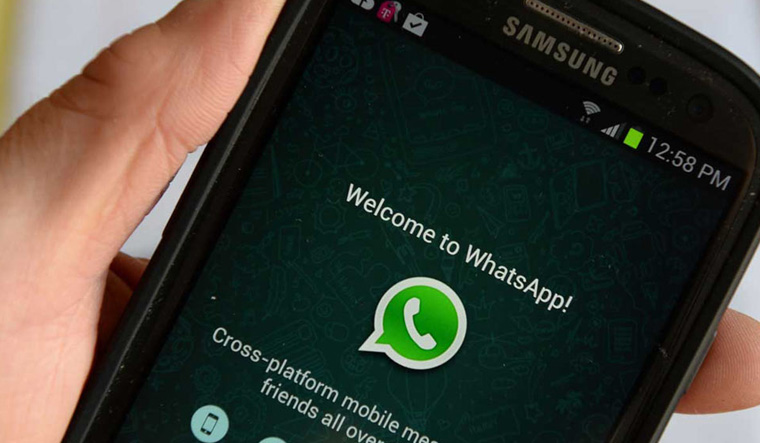WhatsApp on Thursday said Indian journalists and human rights activists were among those globally spied upon by unnamed entities using an Israeli spyware Pegasus, leading to a furore over breach of citizens' privacy.
Following the disclosure by WhatsApp, the Indian government has asked the messaging platform to explain the matter and list out the measures that have been taken by it to safeguard privacy of millions of Indians.
"Government of India is concerned at the breach of privacy of citizens of India on the messaging platform Whatsapp. We have asked Whatsapp to explain the kind of breach and what it is doing to safeguard the privacy of millions of Indian citizens," IT Minister Ravi Shankar Prasad said in a tweet.
WhatsApp had said it was suing NSO Group, an Israeli surveillance firm that is reportedly behind the technology that helped unnamed entities' spies hack into phones of roughly 1,400 users spanning across four continents, including diplomats, political dissidents, journalists and senior government officials.
However, it did not say on whose behest the phones of journalists and activists across the world were targeted.
Refusing to divulge identities or the exact number of those targeted in India, WhatsApp said it had in May stopped a highly sophisticated cyber attack that exploited its video calling system to send malware to its users.
The mobile messaging giant said it had sent a special WhatsApp message to approximately 1,400 users that it has "reason to believe were impacted by this attack to directly inform them about what happened".
While the messaging giant did not disclose the details or the number of people affected in India, a WhatsApp spokesperson said: "Indian users were among those contacted by us this week."
WhatsApp has over 1.5 billion users globally, of which India alone accounts for about 400 million. In the past too, WhatsApp has drawn flak from the Indian government on the platform being misused for spreading misinformation that led to incidents of mob lynching.
The government has categorically told WhatsApp that it wants the platform to bring in a mechanism to enable tracing of originator of messages, a demand that WhatsApp has resisted citing privacy issues. The government is also working on tightening rules of social media companies in India that will increase the accountability of such platforms.
Reports claimed that human rights lawyer Nihalsing Rathod, Chhattisgarh-based activist Shalini Gera and former BBC journalist Shubhranshu Choudhary were among those who had admitted to being targeted by the spyware on WhatsApp. However, this could not be independently verified.
Denying allegations by WhatsApp, NSO had said it provides "technology to licenced government intelligence and law enforcement agencies to help them fight terrorism and serious crime" and is not "designed or licensed for use against human rights activists and journalists."
Meanwhile, the Indian IT Ministry on Thursday wrote to WhatsApp, seeking a detailed response by November 4.
A senior government official told PTI that WhatsApp has been asked to give a detailed response to the entire allegations.
Prasad, in his tweet, said the government is committed to protecting the privacy of Indian citizens. He asserted that government agencies have a "well established protocol for interception which includes sanction and supervision from highly ranked officials in central and state governments, for clear stated reasons in national interest."
Earlier on Thursday, Congress had alleged that the Modi government has been "caught snooping" and urged the Supreme Court to hold the Centre accountable over the issue.
Hitting back at Opposition's charges, Prasad said those trying to derive political gains out of it should be reminded of bugging incidents in the office of former finance minister Pranab Mukherjee during the UPA regime, as also spying over the then Army chief Gen V K Singh.
"Those trying to make political capital out of it need to be gently reminded about the bugging incident in the office of the then eminent Finance Minister Pranab Mukherjee during UPA regime. Also a gentle reminder of the spying over the then Army Chief Gen. V. K. Singh," Prasad said.
WhatsApp had on Tuesday filed a lawsuit in a California federal court against NSO Group, which allegedly developed the spyware, saying an attempt was made to infect approximately 1,400 "target devices" globally with malicious software to steal valuable information from those using the messaging app.
WhatsApp said it "believes the attack targeted at least 100 members of civil society... this number may grow higher as more victims come forward".
WhatsApp Head Will Cathcart said these victims include human rights defenders, journalists and other members of the civil society across the world.
"Tools that enable surveillance into our private lives are being abused, and the proliferation of this technology into the hands of irresponsible companies and governments puts us all at risk," Cathcart said in an op-ed in The Washington Post.
Cathcart asserted that WhatsApp was committed to the fundamental right to privacy and that it is working to stay ahead of those who seek to violate that right.



